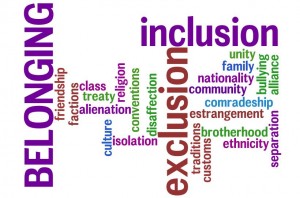Cultural diversity is a concept that it is valued by most progressives, and even the non-progressive and monocultural, though they may not value others’ cultural identities, would die before they allowed someone to strip them of their heritage. But is praising cultural diversity a healthy practice? Though I would like to think so, I wonder if it really is beneficial, especially if we wish to decrease the high levels of violence and hate in our societies.

I was born in Southern California, but set foot on three different continents before my first birthday. I have lived in the Democratic Republic of Congo, Kenya, France, and Texas. I have traveled to approximately 15 different countries. I am the descendant of a survivor of one of the worst and most neglected genocides in history—that of the Armenians. Needless to say, when it comes to cultural diversity, I lack no experience. Yet through all this, I have not come out with a particularly passionate view of the plethora of cultures that inhabit our world, rather I have come to view them as a significant source of violence and hatred. Could it be that mankind would be more productive and peaceful were it not for all this diversity?
Fukuyama, a political and economic scientist, wrote a book titled The End of History in which he discusses the development of liberal democracy as being the “end point of mankind’s ideological evolution.” However, Fukuyama limits his idea to state ideology and claims that the shift into liberal democracy will only eliminate conflict between “post-historical” states. Could we then extend this concept to include secular globalism? After all, religion and cultural identities (which are really synonymous in the majority of the world) appear to supersede, in most cases, that of national identity.
Fukuyama bases his theory on observable historical trends. He is deeply influenced by Hegelian thought, stating, “Hegel was the first philosopher to speak the language of modern social science, insofar as man for him was the product of his concrete historical and social environment.” Much like Hegel, Fukuyama sees historical trends suggesting a progression in humankind, not necessarily towards a utopian-style society as perhaps Marx would, but rather, “a moment in which a final, rational form of society and state became victorious.” This is to say that despite there still being violent acts perpetrated by individuals, there will be no more large-scale cultural or ideological inspired acts of violence.
Similar to both of these thinkers, I would like to take a look at the historical development of cultures from around the world. The Armenians and the Turks are an obvious choice for me, given my heritage. My ancestors were slaughtered in the early 20th century, and to this day many Turks still deny that this genocide ever happened. Violence against the Armenians still residing in Turkey continues today, not to any genocidal proportions, but the hatred remains deeply rooted in the culture. The simple explanation is the same one that explains the never ending slaughters in the Balkans, and the incessant retributive attacks between the Palestinians and the Israelis–it is due to cultural and religious diversity.
On an individual level, a Catholic and a Muslim, for example, can have a peaceful and loving relationship. But, on a larger scale, if we wish to maintain our separate cultural identities, it seems unlikely that we can live in divided communities without developing hatred and violence. For thousands of years the Croats, Serbs, and Bosniaks have been slaughtering each other, for thousands of years the Jews and Arabs have despised each other, and for thousands of years the Turks and the Armenians have been at each other’s throats.
Where peace has begun to develop is within secularized, postmodern, Western societies. Could it be that as secularization settles in, as cultural identities are abandoned, and as we enter into not only a liberal democratic world but a secular and globalized world, that we will see peace, innovation and prosperity? It is in this environment that humankind seems to thrive together.
While I cringe at the thought of abandoning cultural diversity, as I do see beauty that has come out of various cultures, I would like to see peace develop in this world on a large scale. It seems as though the societies in which mass cultural violence has been near eradicated are secular and globalized societies, where cultural heritage is but a vague memory and faith is personal and disconnected from society as a whole. Is there any way we can practically achieve worldwide peace while maintaining cultural diversity?
